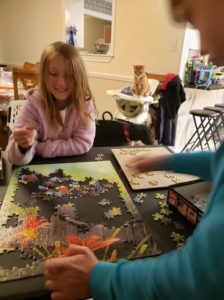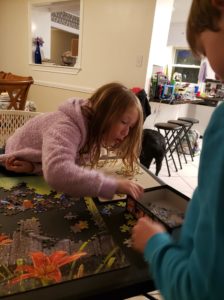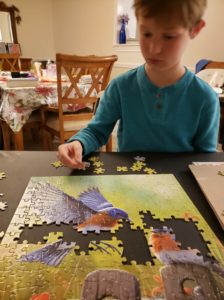
On our recent trip to babysit grandkids and visit a few extra days, we brought gifts. No, not new games or nicely wrapped packages. We brought children’s stuff from our house to theirs: puzzles, and a few books (we brought two boxes of books the last trip).
They have no shortage of books of puzzles at their house, but, due to garage sale over-buying, we definitely have a surplus here. Lynda went through the children’s puzzles and selected a number—two boxes worth—to take. Needless to say, the parents at the other end of the gift weren’t exactly thrilled with more stuff in the house.

But, they have a good place to donate them if they turn out to be truly surplus, which they undoubtedly will.
When you have new puzzles in the house, you do them, right? We got little Elijah, 5 years old, to do a number of the puzzles at the younger end of his age range, and maybe one at the older range. We also got Elise, 8, and Ezra, 10 to work on larger puzzles. In the course of doing one, which I’m calling “puzzling”, I was reminded how in our family puzzling has always been a blood sport.

By that I mean that people get aggressive in trying to find pieces in a certain area of the board. They hoard the pieces for that area and try to keep anyone else from working the area. If someone does try to put a piece in, the speed of the puzzling picks up. You’ve got to go fast before someone else does what you want to do. If you see someone reaching for a piece you might need, you quickly grab it and try to put it in place ahead of them. This gets worse the closer you get to the end of the puzzle, when fewer pieces are easier to find and put in place. This is really when puzzling becomes a blood sport.
I first saw this puzzling behavior in our daughter when, as an adult on visits, we would do puzzles and the aggressiveness came out. Our son, not quite so much. Neither my wife or I are truly like that, though I don’t mind twisting people’s tails a little by pretending to go after their pieces, just to get them going.
So, Ezra and Elise began a 300 piece puzzle. Not all that big, as they have both done bigger on their own, but flat surface space was at a premium. They abandoned the puzzle. Then I, bored with reading the books I’d brought with me, began working on it. That brought them back, first Elise, later Ezra. Ezra and I finished it, him hiding a piece to be sure that he would be the one to put the last piece in. That is aggressive puzzling. Of course, I had threatened to do the same thing but then didn’t. I suppose I gave him the idea.
It was a good time. We didn’t get out another puzzle, but set the stage for future family puzzling on other trips. And when they next come here, I foresee the card table going up and a 500 piece puzzle coming out. Maybe two.
We LOVE to puzzle in this house, but it is interesting to see how 2 people can view the project so differently. I puzzle by color and pattern, paying no attention to the final picture. Dave puzzles by seeing the actual picture as it unfolds. As for hoarding the last piece . . . my father was famous for sticking one piece in his pocket, so he could put in the last piece, although he seemed to have almost no interest in puzzling. After he passed on, I was cleaning out his closet and found a single piece in several of his suit coats. Alas, there are puzzles floating around somewhere minus the last piece, because my father got distracted and forgot to finish them or forgot what he did with the piece in question.
Hi Trish. Yes, puzzling behavior is good. I’m not cutthroat at it, though it’s fun to watch others who operate in that mode.